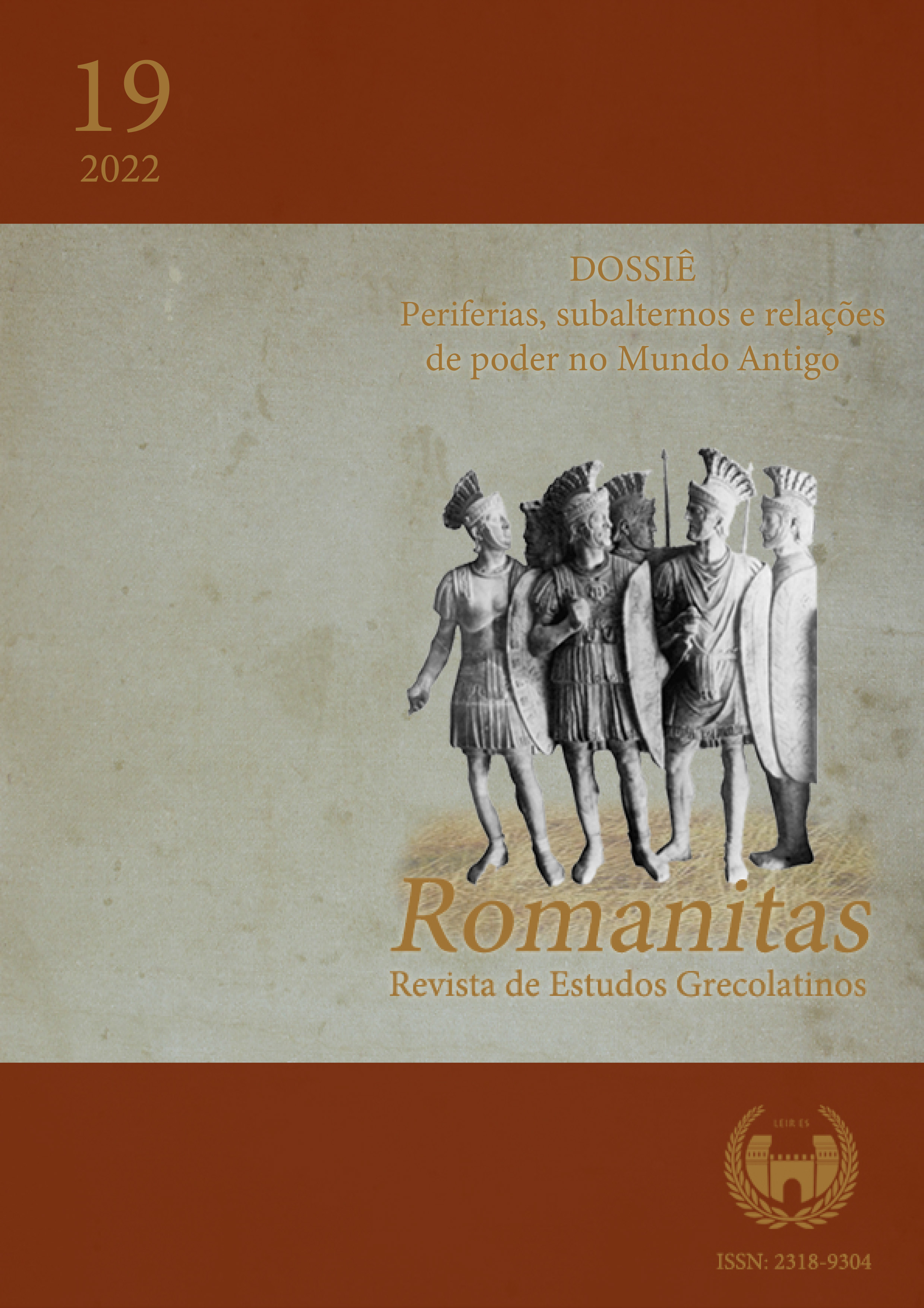Desperation, miserability and repugnance: harmful effects in some erotic-loving experiences described by Catulus
DOI:
https://doi.org/10.29327/2345891.19.19-9Keywords:
Catullus, Elegies, Fides, Pietas, Servitum Amoris, Militia AmorisAbstract
After translating Catullus’ poem LXXXVI, some damaging
effects from erotic-loving experiences are visible throughout the lover’s experience of despair and miserability. Such conditions are resultant of the maintenance of fides and pietas, famous conceptions in the Latin epics that are re-signified in urban environments at the end of the republican period. In this context, a destruction of persona animus and a repugnance feeling pervade the lover as a whole, making him unable to live with dignity neither to civil conceptions, nor to individual predispositions. The Servitum Amoris, member of Venus’ hosts, Militia Amoris, calls for divine intervention and seeks to return to the negotium in order to achieve his well-being. A comparative analysis with other poems in Catullus’ collection corroborates, not only aesthetic receptions from multiple hellenistic traditions in Latin literature, but also unveils social transformations in Roman Urbs, mainly due to re-significations of traditional conceptions.
Downloads
References
Documentação textual
CATULO. O livro de Catulo. Tradução comentada dos poemas de Catulo por João Angelo Oliva Neto. São Paulo: EdUSP, 1996.
VIRGÍLIO. Bucólicas. Tradução de Raimundo Carvalho. Belo Horizonte: Crisálida, 2005.
Obras de apoio
ANTUNES, Leonardo. Safo - Fr. 1 e Fr. 31. Belo Horizonte: Nuntius Antiquus 4, 2009, p. 138-146.
CATULO. O livro de Catulo. Tradução Comentada dos poemas de Catulo por João Angelo Oliva Neto. São Paulo: EdUSP, 1996.
FEDELI, Paolo. A poesia de amor. In: CAVALLO, Guglielmo; FEDELI, Paolo; GIARDINA, Andrea (Org.).. O espaço literário da Roma antiga. Tradução Daniel Peluci Carrara; Fernanda Messeder Moura. Belo Horizonte: Tessitura, 2010. v. 1 (A produção do texto). p. 151-186.
GREENE, Ellen. Catullus and Sappho. Marilyn Skinner (Org.).. A Companion to Catullus. Blackwell Companions to the Ancient World. Malden, Blackwell Publishing Ltd., 2007, pp. 131-150.
HOWATSON, M.C. (Org.). The Oxford Companion to Classical Literature. New York: Oxford University Press, 1989.
KNOX, Peter. Catullus and Callimachus. Marilyn Skinner (Org.).. A Companion to Catullus. Blackwell Companions to the Ancient World. Malden, Blackwell Publishing Ltd., 2007, pp. 151-172
LABATE, Mario. A elegia amorosa: Cornélio Galo. In: CITRONI, Mario et al (Org.).. Literatura da Roma Antiga. Lisboa: Fundação Calouste Gulbenkian, 2006. p. 547-558.
LUCK, Georg. La elegía amorosa. In: CLAUSEN, W.V.; KENNEY, E.J. (Org.). Historia de la literatura clássica. Literatura Latina. Madrid: Gredos, 1989. p. 448-463.
PEREIRA, Maria Helena da Rocha. Estudos de história da cultura clássica. Vol II Cultura Romana. Lisboa: Calouste Gulbenkian, 1984, 319-423.
PROPÉRCIO. The Elegies. London: William Heinemann, 1929.
Downloads
Published
How to Cite
Issue
Section
License
Copyright (c) 2022 Jean Felipe de Assis

This work is licensed under a Creative Commons Attribution-NonCommercial-NoDerivatives 4.0 International License.
a. The authors retain copyright and grant the journal the right to first publication.
b. The authors are authorized to assume additional contracts separately, for non-exclusive distribution of the version of the work published in this journal (e.g., publishing in institutional repository or as a book chapter), with acknowledgment of authorship and initial publication in this journal.
c. Authors are allowed and encouraged to publish and distribute their work online (e.g. in institutional repositories or on their personal page) after the first publication by the journal, with due credit.
d. The journal's texts are licensed under a CC BY 4.0 Deed Attribution 4.0 International Licence (CC BY).




























